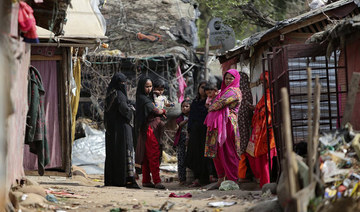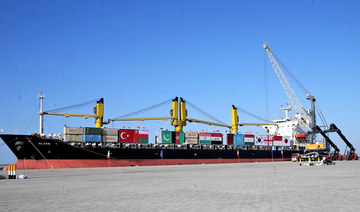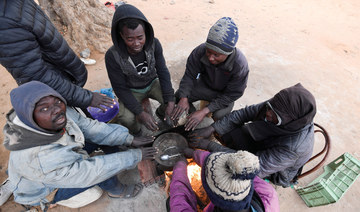NEW DELHI: Thousands of women joined protests by farmers on the outskirts of Delhi on Monday to mark International Women’s Day, demanding the scrapping of new laws that open up agriculture produce markets to private buyers.
Since December, many farmers accompanied by their families have camped at three sites on the outskirts of the Indian capital to oppose the biggest farm reforms in decades, which they say hurt them.
Wearing bright yellow scarves representing the color of mustard fields, the women took centerstage at one key site, chanting slogans, holding small marches, and making speeches through loudspeakers to target the laws.
“This is an important day as it represents women’s strength,” said Veena, a 37-year-old from a farming family, who gave only one name in order to protect her identity.
“I believe if us women are united, then we can achieve our target much quicker,” added Veena, who traveled from the northern state of Punjab to the sprawling Tikri protest spot.
More than 20,000 women gathered at the site near Delhi’s border with the state of Haryana, police and event organizers said.
“This is a day that will be managed and controlled by women, the speakers will be women, there will be a lot of feminist perspectives brought in, and discussions on what these laws mean for women farmers,” said farm activist Kavitha Kuruganti.
“It is one more occasion to showcase and highlight the contribution of women farmers both in agriculture in India as well as to this movement.”
India says the reforms will bring private investment into a vast and antiquated farm sector, improve supply chains and cut colossal waste.
Faced with the protests, Prime Minister Narendra Modi’s government offered to suspend the laws for 18 months, but the farmers have refused to back down, demanding their repeal.
Agriculture accounts for nearly 15% of India’s $2.9 trillion economy and employs about half its workforce.
Women farmers have as much at stake as men from the new laws, Kuruganti added.
“Markets that are distant as well as exploitative make single women farmers more vulnerable, and in any case a patriarchal society has discriminated and made them vulnerable.”
Thousands of women join Indian farmers’ protests against new laws
https://arab.news/jsd46
Thousands of women join Indian farmers’ protests against new laws
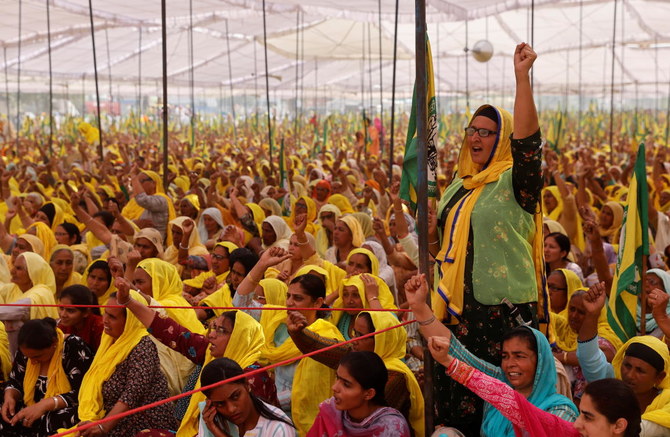
- Faced with the protests, Prime Minister Narendra Modi’s government offered to suspend the laws for 18 months
- More than 20,000 women gathered at the site near Delhi’s border with the state of Haryana
Ukraine says Russian shelling targets civilians in Kharkiv region

- Ukrainian prosecutors said they were investigating as a potential war crime a Russian air strike on a residential area of the regional capital Kharkiv in which six civilians were wounded
KHARKIV: Ukraine said Russian shelling targeted civilians in two cities in the northeastern region of Kharkiv on Saturday while President Volodymyr Zelensky reported successes by troops fighting a renewed Russian assault there.
Ukrainian prosecutors said they were investigating as a potential war crime a Russian air strike on a residential area of the regional capital Kharkiv in which six civilians were wounded, including a 13-year-old girl, 16-year-old male and an eight-year-old.
Moscow denies deliberately targeting civilians but thousands have been killed and injured since its February 2022 invasion of Ukraine.
About 70 km (45 miles) to the northeast in Vovchansk, a city just 5 kilometers (three miles) from the Russian border, prosecutors said Russian shelling killed a 60-year-old woman and injured three other civilians. A 59-year-man was also injured in the village of Ukrainske, they said.
Across the border in Russia’s Belgorod region, Moscow’s defense ministry said its forces shot down a Tochka-U missile fired by Ukraine. A similar missile caused a Belgorod apartment building to collapse last week, killing at least 15 people, Russia said.
Late on Saturday Belgorod regional governor Vyacheslav Gladkov said a Ukrainian drone attack injured a woman and a man in the village of Petrovka. They were treated for shrapnel injuries in Belgorod, he wrote on the Telegram messaging app.
Zelensky said in his nightly video address that Ukrainian forces were on surer footing, particularly in Kharkiv region.
“The occupier is losing its infantry and equipment, a tangible loss, even though, just as in 2022, it was counting on a quick advance on our land,” Zelensky said, referring to Russia’s initial invasion of Ukraine in February of that year.
However, Russia’s defense ministry said its forces captured the village of Starytsia in the Kharkiv region on Saturday, eight days after a new Russian push in the area began.
Zelensky said his forces repelled an assault farther south in the eastern Donetsk region around Chasiv Yar, a city seen as a key target in Russia’s campaign. “Our soldiers destroyed more than 20 units of the occupier’s armored vehicles,” he said.
Reuters could not immediately verify the battlefield accounts.
Regional governor Vadym Filashkin credited special units under the HUR military intelligence agency for the battlefield success, which he said took place on Friday.
“There is not a single occupier in Chasiv Yar,” he said on the Telegram messaging app. “They burned armored vehicles and smashed enemy ranks,” he added in comments accompanying a video showing vehicles exploding.
In the village of Stanislav in the southern region of Kherson, governor Oleksandr Prokudin said a Russian drone strike killed a man about 40 years old and injured a woman.
Tunisia recovers bodies of four migrants off its coast, rescues dozens

- Tunisia has replaced Libya as the main departure point for people fleeing poverty and conflict in Africa and the Middle East
TUNIS: Tunisia recovered the bodies of four migrants off the country’s coast on Saturday, the national guard said, amid an increase in migrant boats heading from Tunisia toward Italy in recent weeks.
The force said the coast guard separately rescued 52 migrants. The national guard arrested nine smugglers, and boats were seized.
At least 23 Tunisian migrants were missing after setting off in a boat for Italy, the national guard said earlier on Saturday.
Tunisia is facing a migration crisis and has replaced Libya as the main departure point for people fleeing poverty and conflict in Africa and the Middle East in the hope of a better life in Europe.
New Caledonia ‘under siege’ as French troops bid to restore order

- The unrest has been blamed on economic malaise, social tensions and — above all — a political fight between mostly Indigenous pro-independence activists and Paris authorities
- New Caledonia has been a French territory since the mid-1800s
NOUMEA, New Caledonia: French Pacific territory New Caledonia was “under siege” Saturday, the mayor of its capital Noumea said, after another person was killed, bringing the toll to six in six days of unrest.
Two other men were wounded in Saturday’s deadly incident, which occurred in the archipelago’s northern Kaala-Gomen area, General Nicolas Mattheos said.
Hundreds of heavily armed French soldiers and police patrolled the debris-filled streets of Noumea Saturday.
But Philippe Blaise, vice president of the territory’s southern province, said: “Today, the rule of law, security for citizens, are not back in place everywhere in (New) Caledonia.”
And Noumea mayor Sonia Lagarde told news channel BFMTV: “We’re far from getting back to calm.”
Anger is still high over a contested voting reform, even after the arrival of hundreds of military and police reinforcements.
AFP reporters in the city’s Magenta district saw vehicles and buildings torched, with riot police on the scene trying to reassert control.
Overnight, residents reported hearing gunfire, helicopters and “massive explosions” — seemingly gas canisters blowing up inside a burning building.
For days, Helene, 42, has been guarding makeshift barricades in shifts with neighbors as they waited for hundreds of French security forces to be flown in to restore order.
“At night we hear shooting and things going off,” she told AFP. “Helicopters and military planes landing — which is sweet music to our ears.”
Economic malaise
For almost a week, the usually calm oceanside city has been convulsed with violence.
Two gendarmes and three other people, Indigenous Kanaks, have also been killed.
The unrest has been blamed on economic malaise, social tensions and — above all — a political fight between mostly Indigenous pro-independence activists and Paris authorities.
French officials have accused a separatist group known as the CCAT of being behind the riots and have placed 10 of its activists under house arrest.
CCAT on Friday called for “a time of calm to break the spiral of violence.”
Annie, an 81-year-old Noumea resident, said the week’s violence had been worse than that seen during the tumultuous 1980s: a time of political killings and hostage-taking referred to as “The Events.”
“At the time, there weren’t as many weapons,” she said.
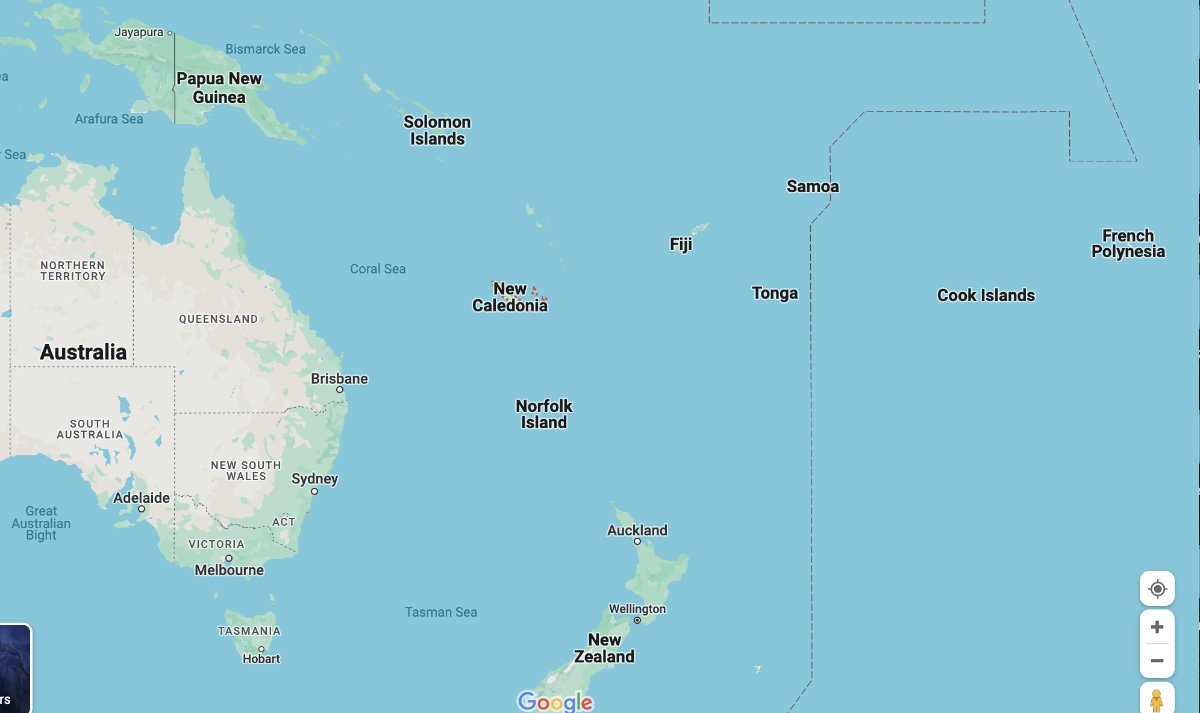
Seeking independence
New Caledonia has been a French territory since the mid-1800s.
Almost two centuries on, its politics remains dominated by debate about whether the islands should be part of France, autonomous or independent — with opinions split roughly along ethnic lines.
The latest cycle of violence was sparked by plans in Paris to impose new voting rules that could give tens of thousands of non-Indigenous residents voting rights.
Pro-independence groups say that would dilute the vote of Indigenous Kanaks, who make up about 40 percent of the population.
French authorities have called for talks and insist the situation is now “calmer” and being brought under control.
Around 1,000 security forces began reinforcing the 1,700 officers on the ground from Thursday.
Efforts to negotiate peace have so far stumbled, although French President Emmanuel Macron had begun contacting pro- and anti-independence officials individually on Friday, his office said.
'Azerbaijani actors'
A local business group estimated the damage, concentrated around Noumea, at 200 million euros ($217 million).
The damage to the islands’ reputation may cost even more.
Tourism is a big earner for New Caledonia, but an estimated 3,200 tourists and other travelers have been stranded inside or outside the archipelago by the closure of Noumea’s international airport.
The unrest has also pushed organizers to cancel plans to bring the Olympic flame through New Caledonia on its journey from Athens to Paris — where the summer Games will begin in late July.
“I think everyone understands, given the current context, the priority is consolidating a return to public order and then appeasement,” French Sports Minister Amelie Oudea-Castera said on Saturday.
On Friday, French government agency Viginum said it detected a “massive and coordinated” online campaign pushing claims that French police had shot pro-independence demonstrators in New Caledonia.
Paris pointed to the involvement of “Azerbaijani actors” in the campaign, deepening a diplomatic spat between the two countries.
Azerbaijan has denied accusations of interference in New Caledonia.
1m march in London to mark 76 years of Nakba

- 2-km march led by Gazan photojournalist Motaz Azaiza
LONDON: About 1 million people peacefully marched in London on Saturday to commemorate the 76th anniversary of the Nakba (Catastrophe), which saw the expulsion of nearly 800,000 Palestinians from their homeland when Israel was established in 1948.
Regular Saturday marches in London since the Gaza war began last October have drawn hundreds of thousands of participants.
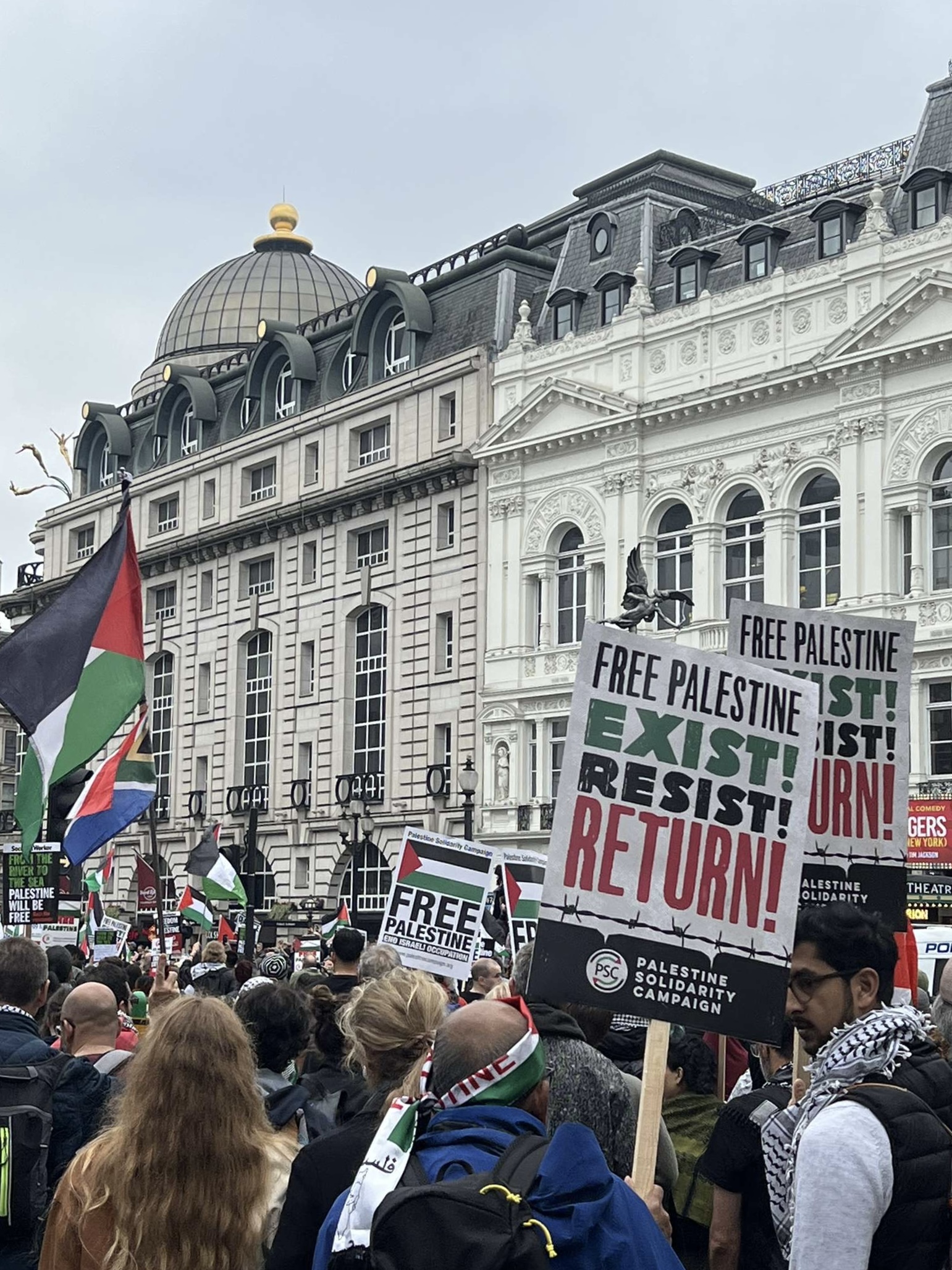
Crowds gathered at the BBC headquarters for a 2-km march led by Palestinian photojournalist Motaz Azaiza and a group of young British Palestinians carrying large lock keys, which symbolize their inalienable right to return to their homes under international law.
Azaiza’s Instagram following has surged to over 18 million as he documented the daily realities of Israel’s invasion and relentless bombardment of Gaza.
Since January, the 24-year-old has been traveling worldwide to advocate for a ceasefire and an end to the Israeli occupation.
“I didn’t believe that I’d stay alive to stand today here in London in front of the people. You saw me there under the bombing,” he told the crowd.
“You made me hope that there was hope. I didn’t believe in anyone, but … today, the moment I saw you all I thought there’s hope. The hope is in the people, not in the governments.”
Several pro-Palestinian organizations across the UK organized the march, calling on the British government to halt arms exports to Israel and restore funding to the UN Relief and Works Agency for Palestine Refugees in the Near East.
“Today, we reflect on the reality that this Nakba couldn’t be sustained by Israel without the enduring complicity of Western powers, including successive UK governments,” said Ben Jamal, director of the Palestine Solidarity Campaign.
“Today, even in this darkest moment, we also march to celebrate and affirm the refusal of the Palestinian people to succumb to erasure. We won’t stop, we won’t rest, until the Palestinian people finally achieve their liberation.”
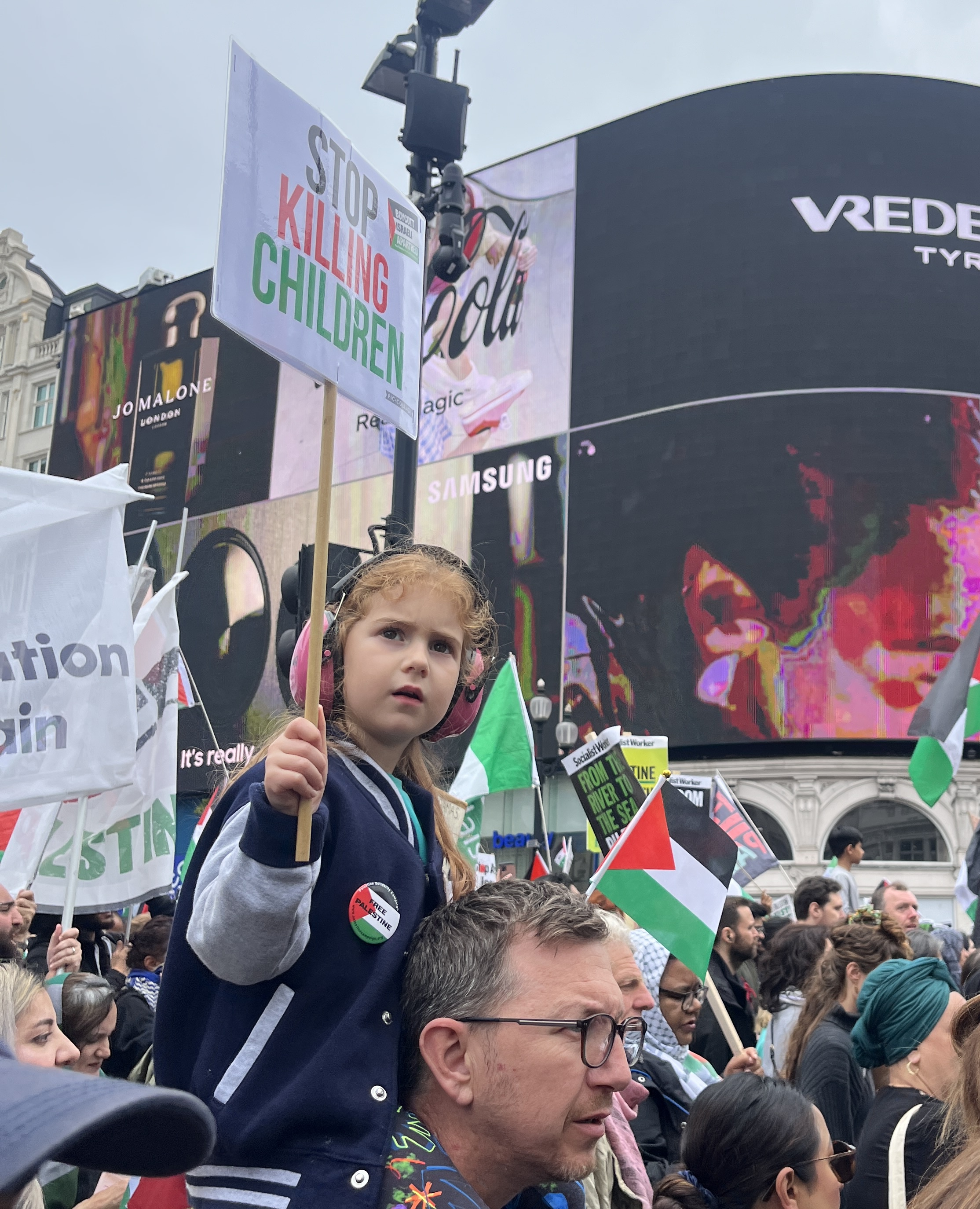
The rally was met with a much smaller counter-protest carrying Israeli flags. There were only eight arrests reported by the London Metropolitan Police.
Parts of northern India scorched by extreme heat with New Delhi on high alert

NEW DELHI: Parts of northwest India sweltered under scorching temperatures on Saturday, with the capital New Delhi under a severe weather alert as extreme temperatures strike parts of the country.
India’s weather department expects heat wave conditions to persist across the north for the next few days, and has put several states on high alert. On Friday, parts of New Delhi reported up to 47.1 degrees Celsius. The nearby states of Punjab, Haryana and Rajasthan also saw temperatures soar and are likely to stay high over the next few days, said Soma Sen Roy, a scientist at the India Meteorological Department.
Roy cautioned people against going outdoors under the afternoon sun, drink lots of water and wear loose-fitting clothes while those who are especially vulnerable like the elderly should stay indoors.
The extreme temperatures in northern India coincide with a six-week-long general election, with experts worried that the heat wave could increase health risks as people wait in long lines to cast their vote or candidates campaign aggressively in the outdoors. One minister fainted due to heat last month while addressing an election rally in Maharashtra state.
Satish Kumar, a 57-year-old rickshaw driver in the capital, said his work was suffering because of the heat. “People are not coming outside, (markets) are nearly empty,” he said.
Pravin Kamath, a 28-year-old who runs a cart selling cold drinks, complained that it was so hot he could hardly stand being outdoors. “But I must work. What can I do? I am poor so I have to do it.”
The main summer months — April, May and June — are always hot in most parts of India before monsoon rains bring cooler temperatures. But the heat has become more intense in the past decade and is usually accompanied by severe water shortages, with tens of millions of India’s 1.4 billion people lacking running water.
A study by World Weather Attribution, an academic group that examines the source of extreme heat, found that a searing heat wave in April that struck parts of Asia was made at least 45 times more likely in some parts of the continent by climate change.



